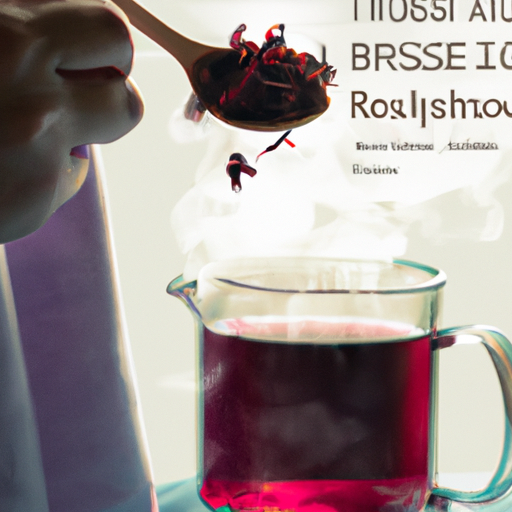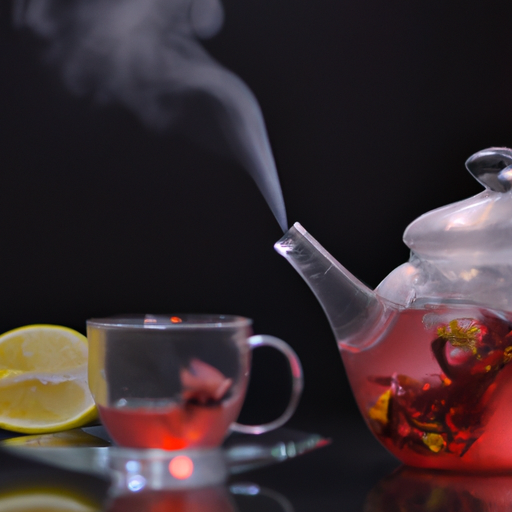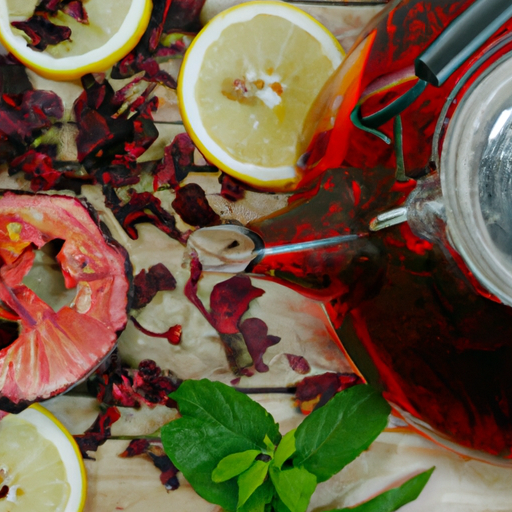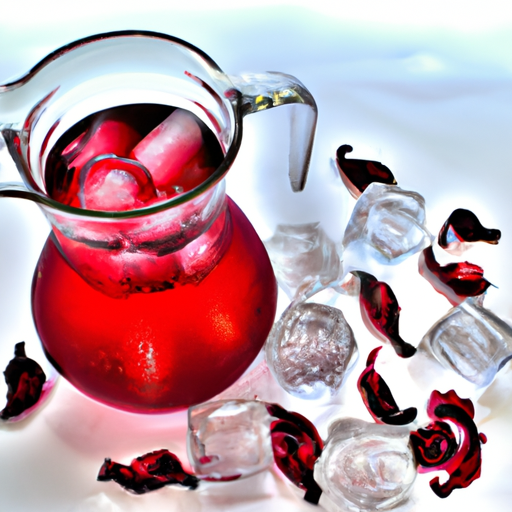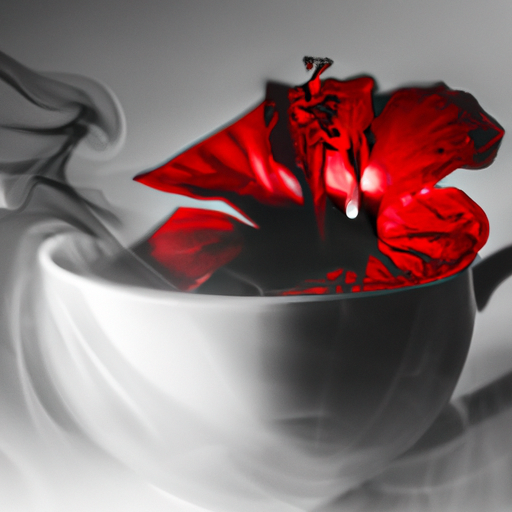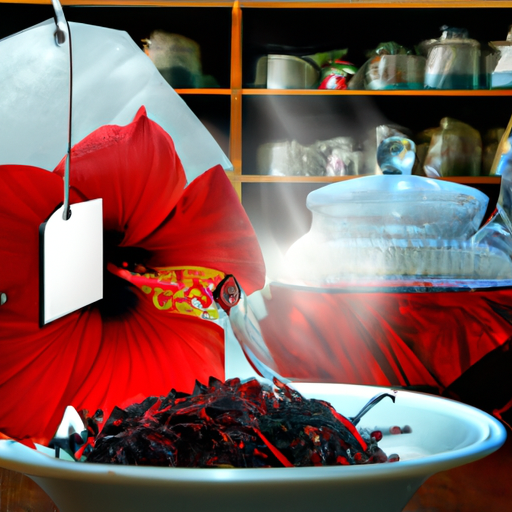As someone who adores tea, I constantly seek out fresh and intriguing blends to incorporate into my assortment. Recently, I’ve taken a liking to hibiscus tea, which impresses not only with its stunning red color but also with its array of health advantages.
However, like with any food or beverage, it’s important to be mindful of how much you consume daily. In this article, I will discuss the recommended daily intake of hibiscus tea and the factors to consider when incorporating it into your diet.
Hibiscus tea is made from the dried calyces of the hibiscus flower and has been consumed for centuries in various cultures around the world. It is known for its tart flavor and ability to lower blood pressure and cholesterol levels. Additionally, it contains antioxidants that may protect against cellular damage and inflammation in the body.
As someone who values holistic wellness practices, these potential benefits piqued my interest in adding hibiscus tea to my routine. But before doing so, I wanted to educate myself on how much is safe and recommended per day.
Key Takeaways
- Recommended daily intake of hibiscus tea varies depending on personal tolerance and medical conditions
- Consume hibiscus tea in moderation to avoid potential side effects such as upset stomach or low blood pressure
- Some medications may interact negatively with hibiscus tea
- Choosing organic and non-GMO options supports sustainable farming practices and promotes healthy living.
Benefits of Drinking Hibiscus Tea
You’ll be pleased to know that incorporating hibiscus tea into your daily routine can provide a plethora of health benefits. This flavorful tea is loaded with antioxidants, which help protect cells in the body from damage caused by free radicals.
Additionally, research has shown that drinking hibiscus tea can lead to lower blood pressure levels, making it an excellent choice for those looking to manage hypertension.
Aside from its impressive antioxidant content and ability to lower blood pressure, hibiscus tea also boasts a number of other nutritional benefits. For example, it’s rich in vitamin C and iron, both of which are essential nutrients for overall health. Vitamin C plays an important role in immune function and skin health, while iron helps transport oxygen throughout the body.
While there are many potential health benefits associated with drinking hibiscus tea, it’s important to note that there are also some risks involved. In particular, consuming large amounts of this beverage may lead to upset stomach or nausea in some individuals. Therefore, it’s best to consume hibiscus tea in moderation and monitor how your body responds.
Potential Risks of Consuming Hibiscus Tea
It’s important to be aware of the potential risks when incorporating hibiscus tea into your daily routine. While this floral drink has numerous health benefits, it also has some potential side effects.
For instance, consuming hibiscus tea in large amounts may lead to low blood pressure or even dizziness. To avoid these potential risks, it is recommended that you consume hibiscus tea in moderation. The dosage recommendations vary depending on factors such as age and overall health status.
If you’re pregnant or have a history of low blood pressure, it’s advisable to consult with your doctor before consuming any amount of hibiscus tea. While hibiscus tea has many health benefits, there are some potential risks associated with its consumption.
It’s important to take note of the dosage recommendations and consume this drink in moderation. In the next section, we’ll explore the recommended daily intake of hibiscus tea for optimal health benefits.
Recommended Daily Intake of Hibiscus Tea
When it comes to the recommended daily intake of hibiscus tea, it’s important to note that individual needs may vary. As someone who enjoys this refreshing beverage, I always consult with my healthcare professional regarding how much is safe for me to consume on a daily basis.
By taking this step, I can ensure that I’m reaping the benefits of hibiscus tea without putting myself at risk for any potential negative side effects.
Varies by Individual
Depending on factors such as age, weight, and overall health, an individual’s optimal intake of hibiscus tea may vary. Personal tolerance also plays a role in determining how much hibiscus tea one can consume safely. Here are four key considerations to keep in mind when deciding how much hibiscus tea you should drink:
-
Health conditions: Certain medical conditions may impact your body’s ability to process certain compounds found in hibiscus tea. For example, individuals with low blood pressure or diabetes should consult with their healthcare provider before consuming large amounts of this beverage.
-
Medications: Some medications may interact negatively with hibiscus tea, causing unwanted side effects or reducing the efficacy of the medication itself.
-
Daily caffeine intake: Hibiscus tea contains caffeine, so if you already consume a lot of caffeinated beverages throughout the day, you may need to limit your intake of this beverage.
-
Other dietary considerations: If you’re following a specific diet plan or have food sensitivities/allergies, be sure to check whether hibiscus tea is allowed and how much is safe to consume.
It’s important to remember that there’s no one-size-fits-all answer when it comes to how much hibiscus tea you should drink each day. To ensure that you’re consuming a safe and appropriate amount for your unique circumstances, it’s always best to consult with a healthcare professional before making any changes to your diet or supplement routine.
Consult with a Healthcare Professional
For optimal safety and appropriate intake, it’s advisable to consult with a healthcare professional before incorporating hibiscus tea into your diet. While hibiscus tea has numerous health benefits, taking too much of it can lead to adverse effects such as liver damage and stomach irritation.
A healthcare provider can help assess your health condition, medication interactions, and suggest the right dosage for you. Consulting with a healthcare professional is particularly important if you have an existing medical condition or are on medication. For instance, drinking hibiscus tea may lower blood pressure levels which could be harmful for individuals already taking blood pressure medications.
Your doctor will also advise on dosage adjustment based on factors such as age, weight and overall health status. Overall, seeking advice from a qualified healthcare provider will ensure that you enjoy all the benefits of hibiscus tea without any associated risks.
When considering how much hibiscus tea to consume per day, there are several factors to consider.
Factors to Consider
Taking into account all factors, it’s important to consider your personal tolerance and consult with a healthcare professional before consuming excessive amounts of hibiscus tea each day. While hibiscus tea has numerous health benefits, including lowering blood pressure and reducing inflammation, it’s essential to remember that too much of anything can be harmful.
Some factors that may affect how much hibiscus tea you should consume daily include age, weight, health status, and medication usage.
Firstly, the amount of hibiscus tea you can drink may depend on your age and weight. As a general rule of thumb, adults should avoid consuming more than three cups per day. However, children and individuals who weigh less than 150 pounds may need to limit their intake further to prevent any adverse effects such as dizziness or nausea.
Secondly, if you have an underlying medical condition or are taking medication regularly, it’s crucial to speak with your doctor before adding hibiscus tea to your diet. Certain medications such as diuretics or antihypertensive drugs can interact with hibiscus tea and cause adverse effects like low blood pressure. Moreover, if you have liver disease or are pregnant/breastfeeding women should also consult their healthcare provider before drinking hibiscus tea.
Lastly, the quality and concentration of the hibiscus tea will also play a role in determining the safe daily dose. It’s vital to choose high-quality teas from reputable brands that do not contain any additives or preservatives. Additionally, steeping time and water temperature will affect how potent the brew is; therefore brewing instructions must be followed carefully.
Considering these factors is crucial when deciding how much hibiscus tea is safe for consumption each day. Once you determine your ideal intake level with the help of a healthcare professional’s guidance, keeping all other aspects in mind like preparation methods can further enhance its benefits for overall health and wellbeing.
Preparation of Hibiscus Tea
To make hibiscus tea, all you need are dried hibiscus flowers, water, and a sweetener if desired.
There are different infusion methods that you can use to prepare the tea. One method is to boil water in a pot or kettle and then pour it over the dried hibiscus flowers in a teapot or cup. Let it steep for 5-10 minutes before straining out the flowers. Another method is to place the flowers directly in cold water and let it sit overnight in the fridge for a cold brew.
The amount of flowers used per cup of tea will depend on personal flavor preferences. A general guideline is to use 1-2 tablespoons of dried hibiscus flowers per cup of boiling water. Adjust the amount according to taste – more for a stronger flavor, less for a milder taste.
Overall, making hibiscus tea is simple and easy to do at home with just a few ingredients. However, if you prefer not to make your own tea there are alternatives available such as pre-made tea bags or bottled teas that can be found at most grocery stores.
Preparing hibiscus tea can be done using various infusion methods and personalized according to one’s taste preferences by adjusting the amount of dried flowers used per cup of boiling water. However, for those who prefer not to make their own tea, there are alternative options readily available on the market.
Alternatives to Hibiscus Tea
There’s a range of other tasty beverages out there that can provide similar health benefits to hibiscus tea. Here are three flavorful and healthy alternatives:
-
Green Tea – Green tea is packed with antioxidants, which help prevent cell damage and reduce the risk of chronic diseases such as cancer and heart disease. It also contains caffeine, which can boost brain function and improve physical performance.
-
Ginger Tea – Ginger has anti-inflammatory properties that can help alleviate pain and reduce the risk of chronic diseases such as arthritis. Drinking ginger tea may also aid in digestion and relieve nausea.
-
Rooibos Tea – Rooibos tea is rich in antioxidants that can help protect against cellular damage and lower the risk of chronic diseases such as cancer and heart disease. It is naturally caffeine-free, making it a great option for those who want to avoid stimulants.
These flavorful options not only taste great but also offer numerous health benefits for your body.
When it comes to choosing high-quality hibiscus tea or any other beverage, it’s important to read labels carefully and look for organic or non-GMO options whenever possible. Additionally, purchasing from reputable brands ensures a higher quality product without harmful additives or fillers. By making informed choices about what we consume, we can support our overall health and well-being in the long run.
Choosing High-Quality Hibiscus Tea
When it comes to choosing high-quality hibiscus tea, there are a few key points that I always consider.
First and foremost, I look for teas that are organic and non-GMO, as this ensures that the tea has been grown without harmful chemicals or genetic modification.
Additionally, I prioritize ethical and sustainable sourcing practices, as these not only benefit the environment but also support fair labor practices.
Finally, I pay attention to the flavor and aroma of the tea itself, seeking out options that offer a delicious taste experience while still maintaining their health benefits.
Organic and Non-GMO
You’ll appreciate the peace of mind that comes with knowing you’re drinking hibiscus tea that’s both organic and non-GMO. Organic certification ensures that no harmful chemicals or synthetic fertilizers were used in growing the hibiscus plants, while non-GMO labeling guarantees that the seeds used to cultivate these plants were not genetically modified.
Choosing organic and non-GMO hibiscus tea is essential for maintaining good health as well as supporting sustainable farming practices. Organic certification is a rigorous process that involves stringent standards for soil health, water conservation, and biodiversity. It also prohibits the use of conventional pesticides and herbicides that can harm beneficial insects, wildlife, and human health.
Non-GMO labeling, on the other hand, means that the hibiscus seeds used to produce your tea have not been altered in any way through genetic engineering techniques such as gene splicing or insertion. By opting for organic and non-GMO hibiscus tea, you’re supporting farming practices that help preserve our environment while promoting healthy living.
Now let’s move on to ethical and sustainable sourcing of hibiscus tea.
Ethical and Sustainable Sourcing
To ensure ethical and sustainable sourcing of hibiscus tea, it’s important to research the company’s supply chain and look for certifications such as Fair Trade or Rainforest Alliance. This means that the hibiscus used in the tea has been grown using sustainable farming methods that benefit both the environment and local communities. Additionally, fair trade practices ensure that farmers are paid fair wages for their labor and have safe working conditions.
When researching a company’s supply chain, here are some key things to look for:
- Certification from organizations like Fair Trade or Rainforest Alliance
- Transparency about where the hibiscus is sourced from
- Sustainability initiatives, such as using renewable energy in production facilities
- Commitment to supporting local communities through education or health programs
- Long-term partnerships with farmers to ensure stability and consistency in sourcing
By choosing companies that prioritize ethical and sustainable sourcing practices, we can support better environmental outcomes and contribute to positive social impact.
Moving forward, let’s explore how these efforts impact flavor and aroma of hibiscus tea.
Flavor and Aroma
Get ready to experience the delightful flavor and aroma of hibiscus tea, as we delve into how ethical and sustainable sourcing practices can impact these sensory aspects of your favorite beverage. Flavor preferences vary from person to person, but generally, hibiscus tea is known for its tart and tangy taste with a slightly sweet undertone. The floral notes in the aroma are also distinct, making it a refreshing drink that can be enjoyed hot or cold.
Brewing techniques play a crucial role in bringing out the optimal flavor and aroma of hibiscus tea. Steeping time, water temperature, and the amount of tea used can all affect the final product. For a stronger taste, longer steeping times or more tea leaves may be necessary. On the other hand, shorter steeping times or less tea may result in a milder flavor profile. Experimentation with different brewing techniques can help you discover your ideal cup of hibiscus tea. In the next section, we’ll explore how proper storage can preserve these flavors over time.
Storing Hibiscus Tea
Properly storing your hibiscus tea can help preserve its flavor and potency. The shelf life of hibiscus tea varies depending on how it is stored. To ensure that your tea stays fresh for as long as possible, it’s important to follow proper storage techniques.
The best storage practices for hibiscus tea involve using a proper container that can control temperature, moisture, and air exposure. Airtight containers are ideal for preserving the quality of both loose leaf tea and tea bags. It’s also important to store your hibiscus tea in a cool, dry place away from direct sunlight.
Maintaining infusion time and brewing methods also plays an important role in flavor retention and aroma preservation. Over-brewing or boiling water can result in a bitter taste, while under-brewing may produce a weak flavor profile. Therefore, it’s recommended to steep hibiscus tea in hot water between 5-10 minutes.
Now that you know how to properly store your hibiscus tea, you can experiment with different recipes! Whether you’re making iced teas or adding it to cocktails, there are many ways to enjoy this flavorful beverage beyond just sipping on it plain.
Trying New Recipes with Hibiscus Tea
If you’re feeling adventurous, why not spice things up by adding a dash of hibiscus tea to your favorite cocktail recipe? After all, variety is the spice of life! Hibiscus tea cocktails are becoming increasingly popular among mixologists and home bartenders alike. The tart and floral notes of hibiscus blend well with a variety of spirits, such as vodka, gin, tequila or rum.
To give you some inspiration for your next happy hour gathering or weekend soirée, I’ve put together a table showcasing five easy-to-make hibiscus tea cocktails. From the classic Margarita with a twist to an elegant Hibiscus Gin Fizz, there’s something for everyone. These recipes are perfect for both beginner and experienced mixologists who want to experiment with new flavors in their drinks.
But hibiscus tea isn’t just limited to beverages! You can also use it in baking to add color and flavor to your desserts. Try incorporating hibiscus into your next batch of cupcakes or sugar cookies. Not only will they look stunning with their pinkish-red hue, but they’ll also have a unique taste that will make them stand out from the usual vanilla or chocolate treats. So go ahead and let your creativity run wild with this versatile ingredient!
Frequently Asked Questions
Can hibiscus tea be consumed during pregnancy?
As a pregnant woman, I was curious about the benefits and risks of consuming hibiscus tea. After researching the topic, I found that while hibiscus tea is generally considered safe during pregnancy, it should be consumed in moderation.
Some studies have suggested that high doses of hibiscus may lower blood pressure, which could be harmful for pregnant women with already low blood pressure levels. Additionally, some sources recommend limiting intake to no more than two cups per day as a precautionary measure.
Overall, while there are potential benefits to drinking hibiscus tea during pregnancy such as improved digestion and immune support, it is important to consult with a healthcare provider and consume it in moderation within the recommended intake guidelines.
Is it safe to consume hibiscus tea while taking medication?
When it comes to consuming hibiscus tea while taking medication, it’s important to be aware of potential interactions. Certain medications, such as diuretics and antihypertensives, can interact with hibiscus tea and potentially lead to adverse effects.
It’s recommended to consult with a healthcare provider before consuming hibiscus tea while on medication. Additionally, it’s important to adhere to dosage limits when consuming hibiscus tea. While there’s no specific daily recommended dose for hibiscus tea, excessive intake can lead to side effects such as dizziness and nausea.
As with any dietary supplement or medication, it’s important to use caution and follow recommended guidelines for safe consumption.
How long does hibiscus tea stay fresh after it is brewed?
Storing hibiscus tea properly is essential to maintaining its freshness. I like to think of it as keeping a bouquet of flowers – just like fresh flowers can brighten up a room, fresh tea can brighten up your day.
After brewing, I recommend storing hibiscus tea in an airtight container and placing it in the refrigerator. This will help prevent any moisture from getting in and causing the tea to spoil or lose its flavor.
The taste of hibiscus tea may change over time, so it’s best consumed within 2-3 days after brewing for optimal taste. If you notice a sour or unpleasant taste, it’s time to discard the tea and brew a fresh batch.
Can hibiscus tea help with weight loss?
Hibiscus tea has been shown to have potential benefits for weight loss. Studies suggest that it may help boost metabolism and suppress appetite, which can aid in weight management. The flavonoids in hibiscus tea may also play a role in reducing inflammation and improving insulin sensitivity, both of which are important factors in maintaining a healthy weight.
There is no set amount of hibiscus tea recommended for weight loss, but incorporating it into your daily routine as part of a balanced diet and exercise plan may be beneficial. As with any dietary supplement, it’s important to consult with your healthcare provider before making any significant changes to your diet or lifestyle.
What are some potential side effects of consuming too much hibiscus tea?
Oh boy, let me tell you about the potential side effects of consuming too much hibiscus tea.
First off, if you’re thinking about chugging this stuff like it’s water, just stop right there.
Too much hibiscus tea can lead to some serious stomach issues, like nausea and vomiting.
And let’s not forget about the potential for dizziness and headaches, which can really put a damper on your day.
So what are the dosage guidelines for this beverage? Well, it’s recommended to stick to no more than 2-3 cups per day to avoid any negative side effects.
Remember folks, moderation is key when it comes to hibiscus tea or any other herbal supplement for that matter.
Conclusion
In conclusion, hibiscus tea is a delicious and healthy beverage that offers numerous benefits for our overall well-being. However, it’s important to remember that moderation is key when consuming any type of food or drink. Based on research and expert recommendations, the ideal daily intake of hibiscus tea should be no more than 1-2 cups per day.
While hibiscus tea has many advantages, there are also a few potential risks to keep in mind. It’s crucial to be aware of these risks and consult with your healthcare provider if you have any concerns about incorporating this beverage into your diet.
With proper preparation and storage, hibiscus tea can make a wonderful addition to your daily routine. It provides a refreshing and nutritious way to stay hydrated while also enjoying its unique flavor profile. So why not give it a try? You never know what new recipes or experiences might await!

